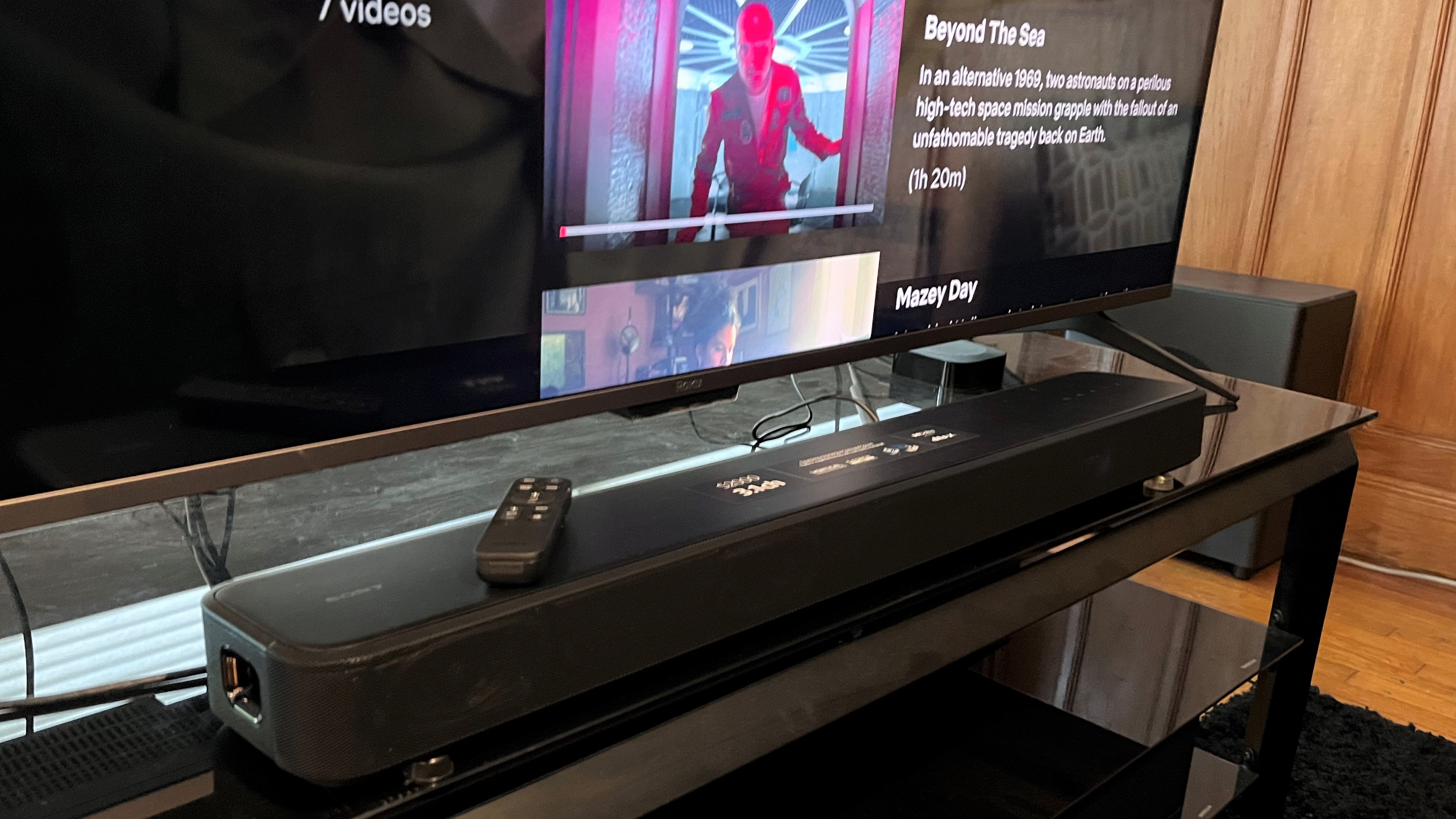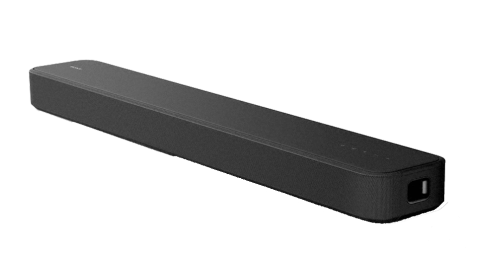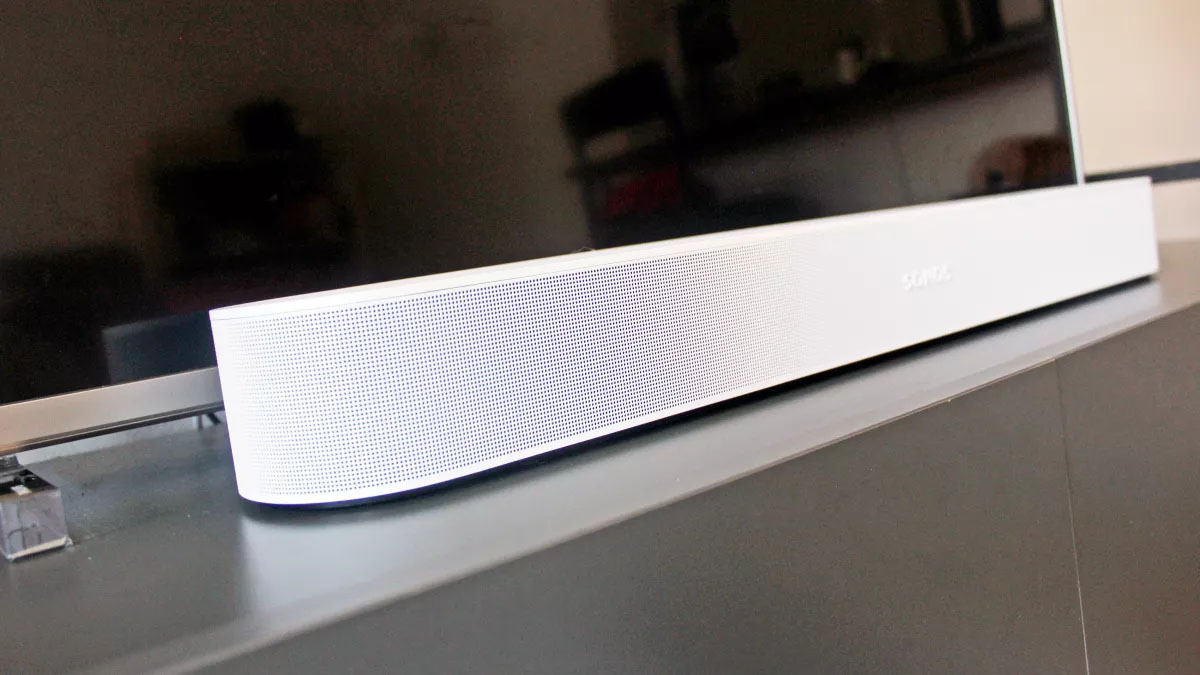3 ways Sony’s budget Dolby Atmos soundbar beats the Sonos Beam, and 2 ways it doesn’t
Battle of the budget Atmos soundbars

Sony’s HT-S2000 is a new 3.1-channel soundbar that’s designed to provide very big sound from a compact box. At $499 (around £390 / AU$730) it’s priced about the same as the Sonos Beam (Gen 2), and like that model it can be enhanced with wireless speakers and a subwoofer for a full surround sound package.
Like many of the best soundbars, the HT-S2000 has onboard Dolby Atmos support, though it uses virtual processing instead of upfiring speakers to deliver the height effects in Atmos soundtracks. In that way, it’s similar to the Sonos Beam (Gen 2), though there are also key differences between the two.
Given the similar price for both, which model is the best fit for you? I’ll run through the advantages that Sony offers over Sonos, as well as the ways it comes up short when the two soundbars are compared, because they'll be hot competitors this year.
Three ways Sony beats the Beam

1. Dedicated center channel speaker
The Sony HT-S2000 uses three separate speaker arrays to deliver the left, right and center channel information in soundtracks, along with a subwoofer for low-frequency effects. An advantage of this design is that dialogue, which makes up the majority of audio content in movie soundtracks, gets its own dedicated speaker.
The Sonos Beam (Gen 2), in contrast, uses a single center mounted tweeter to carry the high-frequency information for all channels, with four mid-woofers dedicated to the mid-range and bass. That’s not to say the Beam doesn’t do a good job of delivering clear dialogue – in our Beam (Gen 2) review we found voices in movies were clear and easy to follow. But in my initial testing of the Sony HT-S2000, I found dialogue handling to be one of its strong points, and that perception corresponds with my experience evaluating other soundbars with a dedicated center speaker.
2. DTS:X processing
The Sony HT-S2000 provides onboard processing for both the Dolby Atmos and DTS:X formats, while the Sonos Beam (Gen 2) only handles Atmos on the immersive soundtrack front. Is this a factor that would cause the hat to tip strongly in Sony’s favor?
Not necessarily. Dolby Atmos dominates in streaming, where it gets delivered via the Dolby Digital Plus format. To find movies with DTS:X soundtracks, you’ll need to instead look to Blu-ray discs, and even there Dolby Atmos is the more common format. Yet another limiting factor is that not all TVs can pass-through DTS:X soundtracks to a soundbar when one of the best 4K Blu-ray players is connected to the set via HDMI.
Even so, there are a number of TVs that enable DTS:X pass-through to a soundbar over an HDMI eARC connection, including models from Sony itself. DTS:X isn’t going away any time soon, and it’s a format that many of the best Dolby Atmos soundbars support. For those reasons alone, DTS:X should be on your features checklist when shopping for a new soundbar.
3. Effective virtual Atmos
When we reviewed the Sonos Beam (Gen 2), one shortcoming that we noted was a lack of any discernible height effect, even though that’s something virtual Dolby Atmos processing is supposed to deliver. We did praise the Beam for its soundstage width and for the convincing sound “wrap around” effect it created – something that the Sony HT-S2000 also did exceptionally well during my initial test.
The Sony soundbar’s compelling surround-like presentation is created by the company’s S-Force Pro Front Surround virtual processing, and its Vertical Surround Engine also delivers a believable sense of height that transcends the TV screen’s physical boundaries. While it’s not exactly overhead sound, it’s definitely an improvement on what you would experience with a non-Atmos soundbar.
Two ways Sony doesn’t beat the Beam

1. No Wi-Fi streaming
One advantage to Sonos soundbars and speakers is an ability to stream audio via Wi-Fi, with the streaming controlled by the company’s excellent app. Wireless network connectivity also lets you connect various Sonos speakers in a multi-room configuration, with the ability to stream the same music to all speakers, or different tracks separately to individual speakers. It also lets you use AirPlay to stream music, which is an added convenience.
Sony’s HT-S2000, in contrast, depends solely on Bluetooth to stream music from a phone or tablet. You can also connect a USB stick loaded with music to the soundbar’s USB port, which will be a higher-quality option than using Bluetooth for music listening, and control the playback using the company’s Home Entertainment Connect app. But Wi-Fi streaming is a superior option to Bluetooth, and probably should be included at Sony’s price point.
2. No room tuning
A Sonos feature called Trueplay lets listeners improve sound quality by tuning the speaker’s output to their environment to compensate for proximity to walls, furniture, or other surfaces that can reflect sound. The process is carried out using the company’s iOS control app, and it generally results in a “tightening” of bass, along with improved clarity over the rest of the audio range.
Sony’s budget soundbar doesn’t offer any features to tune its audio output to the listener’s environment, though the company’s Home Entertainment Connect app does provide setup test tones for positioning the soundbar, wireless surrounds and subwoofer in a multi-channel setup, along with both night and voice enhancement modes as well as bass level adjustment (also available on the Sony’s included remote control).
Final thoughts
Are there any other advantages – or disadvantages – to buying the Sony HT-S2000 over the Sonos Beam? Here’s one advantage: Sony’s new Bravia XR TVs integrate soundbar controls in the onscreen Quick Settings menu, so you can easily make adjustments without reaching for the soundbar’s remote or your phone.
A full review of the HT-S2000 is in the works, and once that’s completed I’ll be able to offer a more definitive verdict. In the meantime, Sonos recently dropped the price of the Beam (Gen 2) to around $399, which is a new low price and a potential reason to choose it over Sony’s soundbar.
Get daily insight, inspiration and deals in your inbox
Sign up for breaking news, reviews, opinion, top tech deals, and more.

Al Griffin has been writing about and reviewing A/V tech since the days LaserDiscs roamed the earth, and was previously the editor of Sound & Vision magazine.
When not reviewing the latest and greatest gear or watching movies at home, he can usually be found out and about on a bike.